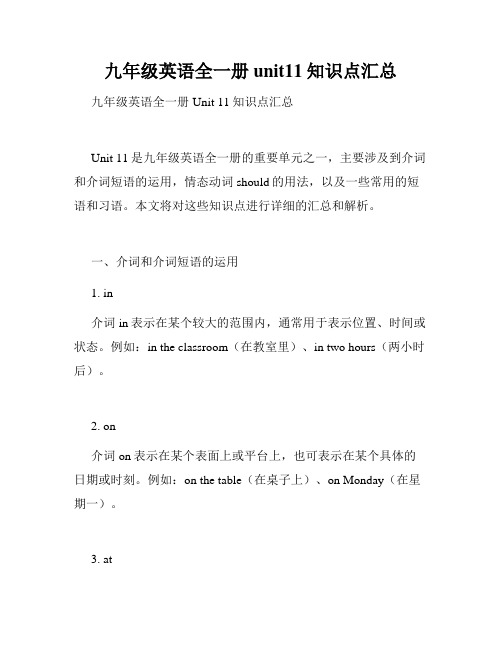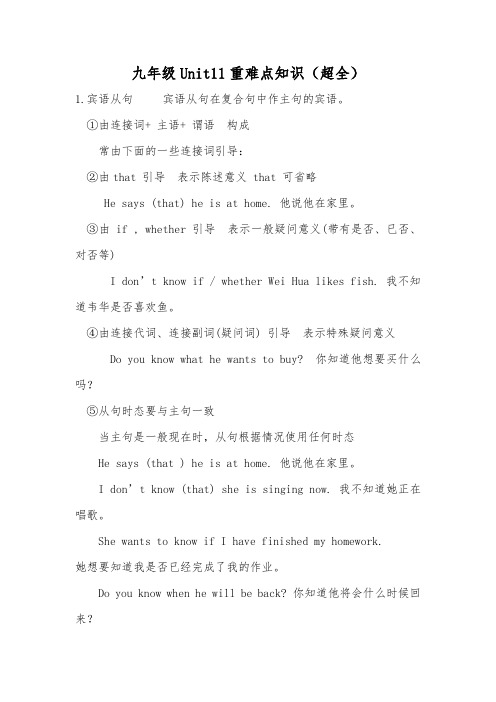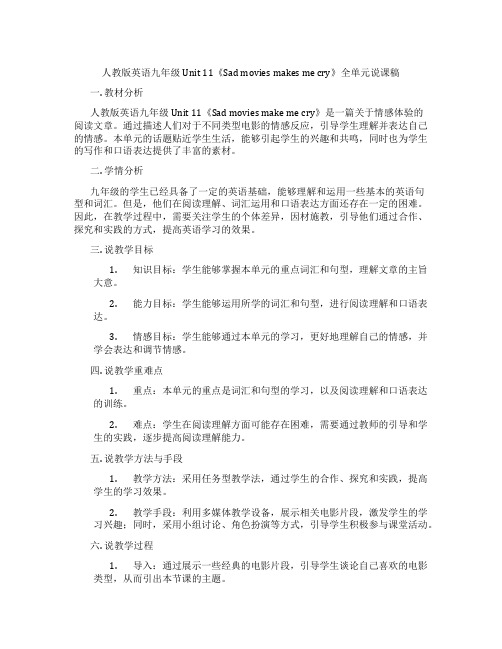九年级Unit11
九年级英语全一册unit11知识点汇总

九年级英语全一册unit11知识点汇总九年级英语全一册Unit 11知识点汇总Unit 11是九年级英语全一册的重要单元之一,主要涉及到介词和介词短语的运用,情态动词should的用法,以及一些常用的短语和习语。
本文将对这些知识点进行详细的汇总和解析。
一、介词和介词短语的运用1. in介词in表示在某个较大的范围内,通常用于表示位置、时间或状态。
例如:in the classroom(在教室里)、in two hours(两小时后)。
2. on介词on表示在某个表面上或平台上,也可表示在某个具体的日期或时刻。
例如:on the table(在桌子上)、on Monday(在星期一)。
3. at介词at表示在某个地点或某个具体的时间点上。
例如:at the bus stop(在公交车站)、at 9 o'clock(在9点)。
4. by介词by表示通过某种方式或手段,也可表示在某个时间之前。
例如:by bus(乘坐公交车)、by tomorrow(到明天为止)。
介词和介词短语的运用在语言学习中非常重要,正确的使用可以增强句子的表达能力和准确性。
二、情态动词should的用法情态动词should表示建议、劝告、命令或期望,常用于祈使句或陈述句中。
例如:You should study harder.(你应该更加努力学习。
)should的否定形式为should not或shouldn't,表示禁止或不应该做某事。
例如:You shouldn't eat too much junk food.(你不应该吃太多垃圾食品。
)应用should不仅能够增强表达的明确性,还能够使语言更加礼貌和客观。
三、常用短语和习语1. make sure这个短语的意思是确保某事,常用于保证某件事情发生或不发生。
例如:Make sure to bring your passport when you travel abroad.(出国旅行时确保携带护照。
九年级英语Unit11

九年级英语Unit11宾语从句宾语从句在复合句中作主句的宾语。
①由连接词+主语+谓语组成常由下面的一些连接词引导:②由that引导表示陈述意义that可省略Hesasheisathe他说他在家里。
③由if,hether引导表示一样疑问意义Idn’tnif/hethereiHualiesfish我不明白韦华是不是喜爱鱼。
④由连接代词、连接副词引导表示特殊疑问意义Dunhatheantstbu?你明白他想要买什么吗?⑤从句时态要与主句一致当主句是一样此刻时,从句依照情形利用任何时态Hesasheisathe他说他在家里。
Idn’tnsheissingingn我不明白她正在唱歌。
SheantstnifIhavefinishedher她想要明白我是不是已经完成了我的作业。
Dunhenheillbeba?你明白他将会何时回来?当主句是一样过去时,从句应利用过去某时态Hesaidheasathe他说他在家里。
Ididn’tnthatsheassingingn我不明白她正在唱歌。
SheantedtnifIhadfinishedher她想要明白我是不是已经完成了我的作业。
Didunhenheuldbeba?你明白他将会何时回来?2getv取得、买、抵达3aeatelephneall打4savene省钱、存钱①问路经常使用的句子:Dunhere…is?anutellehanIgett…?uldutellehtgett…?②an/uld/ill/uldupleasetellesth表示十分客气地询问情形③uldutellehtgettthepar?请你告知我怎么才能去邮局好吗?中的htgettthepar是疑问词与动词不定式连用,用作宾语,但不是宾语从句,可是相当于hIangettthepar(宾语从句)如:Idn’tnhtslvetheprble==Idn’tnhIanslvetheprble我不明白如何解决那个问题anutellehentleave?==anutellehenIillleave?你能告知我何时离开?6日常交际用语:taetheelevatr/esalatrtthe…flr乘电梯/自动扶梯到…楼turnleft/right===taealeft/right向左/右转gpast通过gstraight向前直走7nextt隔壁、紧接着如:LilisnexttAnn莉莉就在安的隔壁。
九年级Unit11重难点知识(超全)

九年级Unit11重难点知识(超全)1.宾语从句宾语从句在复合句中作主句的宾语。
①由连接词+ 主语+ 谓语构成常由下面的一些连接词引导:②由that 引导表示陈述意义 that 可省略He says (that) he is at home. 他说他在家里。
③由if , whether 引导表示一般疑问意义(带有是否、已否、对否等)I don’t know if / whether Wei Hua likes fish. 我不知道韦华是否喜欢鱼。
④由连接代词、连接副词(疑问词) 引导表示特殊疑问意义Do you know what he wants to buy? 你知道他想要买什么吗?⑤从句时态要与主句一致当主句是一般现在时,从句根据情况使用任何时态He says (that ) he is at home. 他说他在家里。
I don’t know (that) she is singing now. 我不知道她正在唱歌。
She wants to know if I have finished my homework.她想要知道我是否已经完成了我的作业。
Do you know when he will be back? 你知道他将会什么时候回来?当主句是一般过去时,从句应使用过去某时态(一般过去时,过去进行时,过去将来时,过去完成时)He said (that) he was at home. 他说他在家里。
I didn’t know that she was singing now. 我不知道她正在唱歌。
She wanted to know if I had finished m homework.她想要知道我是否已经完成了我的作业。
Did you know when he would be back? 你知道他将会什么时候回来?2. get v. 得到、买、到达3. make a telephone call 打电话4. save money 省钱、存钱5. ①问路常用的句子:Do you know where …is ?Can you tell me how can I get to …?Could you tell me how to get to …?②Can/Could/Will/Would you please tell me sth. 表示十分客气地询问事情③Could you tell me how to get to the park?请你告诉我怎么才能去邮局好吗?中的how to get to the park 是疑问词与动词不定式连用,用作宾语,但不是宾语从句,可是相当于how I can get to the park(宾语从句)如:I don’t know how to solve the problem. ==I don’t know how I can solve the problem.我不知道如何解决这个问题Can you tell me when to leave? ==Can you tell me when I ill leave? 你能告诉我什么时候离开?6. 日常交际用语:take the elevator / escalator to the … floor.乘电梯/自动扶梯到…楼turn left / right === take a left / right 向左/ 右转go past 经过 go straight 向前直走7. next to 旁边、紧接着如:Lily is next to Ann. 莉莉就在安的旁边。
Unit11笔记人教版英语九年级全册

Unit 11 知识梳理总结【词汇梳理】drive(v.迫使)→ drove(过去式)→driven(过去分词)→drive sb. crazy/mad使某人发疯/发狂friend(n.朋友)→friendly(adj.友好的)→friendship(n.友谊;友情)bank(n.银行;岸)→banker(n.银行家)examine(v.检查;检验)→examination(n.考试)wealth(n.财富)→wealthy(adj.富有的)weigh(v.称重)→weight(n.重量;分量)pull(v.拉;拖)→push(v.推)power(n.权利;力量)→powerful(adj.有权势的;有影响力的)wealth(n.财富)→wealthy(adj.富裕的)→be wealthy in在......方面富有nod(v.点头)→nodding(现在分词)→nodded(过去分词)agree(v.同意;看法或意见一致)→ agreement(n.)→ disagree(v.反义词:不同意)→ in agreement意见一致disappoint(v.使失望)→ disappointed (adj.失望的)→ disappointing(adj. 令人失望的)→ fort (v.使舒服)→ fortable (adj.使人舒服的)→ fortably (adv. 使人舒服地)→ unfortable (adj.不舒服的)【短语归纳】would rather宁愿the more... the more... 越......就越......have...in mon 有......共同之处leave out忽略,不包括feel like doing sth. 想要做某事call in召来;叫来take one’s position 取代某人的位置hand back归还search for搜寻;查找let...down使......失望kick sb. off开除某人be hard on sb. 对某人苛刻;对某人要求严格pull together齐心协力,通力合作rather than而不是start with=begin with以......开始clean up清扫干净【考点总结】1.I’d rather go to Blue Ocean because I like to listen to quiet music while I’m eating.(该句中,because引导原因状语从句,从句中又包含了一个while引导的时间状语从句)①would rather (not)do sth. 宁愿(不)做某事e.g. I would rather listen to classical music.②would rather do sth. than do sth.=would do sth. rather than do sth.=prefer to do sth. rather than do sth.e.g. I would rather stay at home than go out.=I would stay at home rather than go out.=I prefer to stay at home than go out.2.while conj.当......的时候e.g. While my father was reading a book, my mother was cooking.She was playing the piano when Mary left.3.But that music makes me sleepy.4.so...that... 如此......以至于......e.g. The little boy is so scared that he can’t say anything.He is such a friendly teacher that every student like him.【注1】(高频考点)too...to...意为“太......而不能....”(too+adj./adv.+ to + v.),常与so...that...句型(so++adj./adv +that句子)互换。
(完整版)人教版九年级英语第十一单元知识点总结

人教版九年级英语第十一单元知识点总结Unit 11 Sad movies make me cry一.1.rather adv 可修饰形容词及它的比较级 a little,much,a bit,even,still注意:副词可用来修饰动词,形容词,副词。
2.prefer to do sth rather than do sth=prefer doing sth to(doing) sth =would rather do sth than do sth=would do sth rather than do sth All students prefer to take the bus rather than walk.=All students prefer taking the bus to walking.=All students would rather take the bus than walk.=All students would take the bus rather than walk.Would rather用法1)would rather“宁愿;宁可;更喜欢”,后跟动词原形would rather do sth. =prefer to do sth. I would rather stay at home because it’s cold outside.否定句:would rather not do sth 宁愿不做某事2).一般过去时表示现在或将来的愿望I’d rather you went tomorrow (now). 我宁愿你明天(现在)去。
I’d rather you came next Saturday. 我宁愿你下星期六来。
3).用过去完成时表过去的愿望I’d rather you hadn’t said it. 我真希望你没有这样说过。
I’d rather you hadn’t done that. 我宁愿你没这样做。
人教版英语九年级Unit11《Sadmoviesmakesmecry》全单元说课稿

人教版英语九年级Unit 11《Sad movies makes me cry》全单元说课稿一. 教材分析人教版英语九年级Unit 11《Sad movies make me cry》是一篇关于情感体验的阅读文章。
通过描述人们对于不同类型电影的情感反应,引导学生理解并表达自己的情感。
本单元的话题贴近学生生活,能够引起学生的兴趣和共鸣,同时也为学生的写作和口语表达提供了丰富的素材。
二. 学情分析九年级的学生已经具备了一定的英语基础,能够理解和运用一些基本的英语句型和词汇。
但是,他们在阅读理解、词汇运用和口语表达方面还存在一定的困难。
因此,在教学过程中,需要关注学生的个体差异,因材施教,引导他们通过合作、探究和实践的方式,提高英语学习的效果。
三. 说教学目标1.知识目标:学生能够掌握本单元的重点词汇和句型,理解文章的主旨大意。
2.能力目标:学生能够运用所学的词汇和句型,进行阅读理解和口语表达。
3.情感目标:学生能够通过本单元的学习,更好地理解自己的情感,并学会表达和调节情感。
四. 说教学重难点1.重点:本单元的重点是词汇和句型的学习,以及阅读理解和口语表达的训练。
2.难点:学生在阅读理解方面可能存在困难,需要通过教师的引导和学生的实践,逐步提高阅读理解能力。
五. 说教学方法与手段1.教学方法:采用任务型教学法,通过学生的合作、探究和实践,提高学生的学习效果。
2.教学手段:利用多媒体教学设备,展示相关电影片段,激发学生的学习兴趣;同时,采用小组讨论、角色扮演等方式,引导学生积极参与课堂活动。
六. 说教学过程1.导入:通过展示一些经典的电影片段,引导学生谈论自己喜欢的电影类型,从而引出本节课的主题。
2.阅读理解:学生独立阅读文章,完成相关练习题,教师引导学生讨论答案,解答疑惑。
3.词汇学习:学生通过小组合作,归纳和总结文章中的重点词汇和句型,教师进行讲解和拓展。
4.口语表达:学生分组进行角色扮演,模拟文章中的情景,进行口语表达。
人教版九年级英语Unit11单词、课文知识梳理,词汇句式精讲

人教版九年级英语Unit11单词、课文知识梳理/词汇句式精讲Unit11 单词the more …the more…越……越……leave out不包括;不提及;忽略friendship[frendʃip]n. 友谊;友情king[kiŋ]n. 君主;国王prime[praim]adj. 首要的;基本的minister[ministə(r)]n. 大臣;部长prime minister首相;大臣fame[feim]n. 名声;声誉pale[peil]adj. 苍白的;灰白的queen[kwi:n]n. 王后;女王examine[igzæmin]v.(.仔细地)检查;检验nor[nɔ:(r)]conj. & adv. 也不neither ... nor既不⋯⋯也不palace[pæləs]n. 王宫;宫殿powern. 权利;力量wealth[welθ]n. 财富;富裕grey[grei]a.阴沉的;昏暗的;灰色的lemon[lemən]n.柠檬[kænsl]v. 取消;终止weight [weit]n. 重量;分量shoulder [ʃəuldə(r)] n. 肩;肩膀goal[gəul]n. 球门;射门;目标coach[kəutʃ]n. 教练;私人教师kick[kik]v. 踢;踹teammate[ti:meit]n. 同队队员;队友courage[kʌridʒ]n. 勇敢;勇气rather[ra: ]adv. 宁愿;相当rather than而不是pull[pul]v. 拉;拖pull together齐心协力;通力合作relief[rili:f]n. 轻松;解脱nod[nɔd]v. 点头agreement[ əgri:mənt]n. (意见或看法)一致;同意fault[fɔ:lt]n. 过失;缺点disappoint [disəpɔint] v. 使失望Bert[bə:(r)t]伯特(男名)Holly[hɔli ]霍莉(女名)Unit11 知识梳理【重点短语】1. make me sleepy 使我困倦2. drive sb. crazy 使……发疯3. the more…,the more 越……越……4. yes and no 好坏参半5. be friends with sb. 是某人的朋友6. feel left out 感觉被忽视7. sleep badly 睡眠很差8. don’t feel like eating 不想吃东西9. for no reason 毫无理由10. neither…nor…既不……也不……11. let …down 使…...失望12. take one’s position 替代我的职位13. to start with 起初14. get the exam result back 取考试成绩单15. find out 发现16. remain unhappy forever 仍旧永远不幸福17. a shirt of a happy person 一件快乐人的衬衫【重点句型】1. --I’d rather go to Blue Ocean because I like to listen to quiet music while I’m eating.--But that music make me sleepy.--更愿意到蓝海洋餐厅,因为我喜欢在吃饭时听轻音乐。
人教版英语九年级Unit11单词+课文+知识梳理

人教版英语九年级Unit11单词音频+课文音频+知识梳理03U n i t11知识梳理【重点短语】1. make me sleepy 使我困倦2. drive sb. crazy 使……发疯3. the more…, the more 越……越……4. yes and no 好坏参半5. be friends with sb. 是某人的朋友6. feel left out 感觉被忽视7. sleep badly 睡眠很差8. don’t feel like eating 不想吃东西9. for no reason 毫无理由10. neither…nor… 既不……也不……11. let …down 使…...失望12. take one’s position 替代我的职位13. to start with 起初14. get the exam result back 取考试成绩单15. find out 发现16. remain unhappy forever 仍旧永远不幸福17. a shirt of a happy person 一件快乐人的衬衫【重点句型】1. --I’d rather go to Blue Ocean because I like to listen to quiet music while I’m eating.--But that music make me sleepy.--更愿意到蓝海洋餐厅,因为我喜欢在吃饭时听轻音乐。
--但那种音乐使我困倦。
2. Waiting for Amy drove Tina crazy.等候艾米使蒂娜发狂。
3.The movie was so sad that it made Tina and Amy cry.这部电影是如此悲伤以致使蒂娜和艾米都哭了。
4.Sad movies don’t make John cry. They just make him want to leave quickly.悲伤的电影没有让约翰哭他们只能使他想尽快离开。
- 1、下载文档前请自行甄别文档内容的完整性,平台不提供额外的编辑、内容补充、找答案等附加服务。
- 2、"仅部分预览"的文档,不可在线预览部分如存在完整性等问题,可反馈申请退款(可完整预览的文档不适用该条件!)。
- 3、如文档侵犯您的权益,请联系客服反馈,我们会尽快为您处理(人工客服工作时间:9:00-18:30)。
学员编号:年级:初三课时数:学员姓名:辅导科目:英语学科教师:课题Unit11 Sad movies make me cry.教学目的1. 掌握Unit11的重点短语和句型2. 巩固make 的用法3. 练习写作授课日期及时段日期:教学内容第一模块复习检测翻译下列句子:1.每个人天生具有学习的能力。
____________________________________________________2.研究表明成功的学习者有一些共同的好习惯。
_______________________________________3.我不知道怎样提高我的阅读速度。
________________________________________________4.父母总是对我很有耐心。
____________________________________________________5.有时我会在语法方面犯错误。
_________________________________________________第二模块课堂新授一.知识讲解(一)重点短语:1.使……失望let...down2. 开除kick sb. off3. 而不是rather than4. 齐心协力pull together5. 在肩上on one’s shoulder6. 停止做某事stop doing7. 敲门knock on the door 8. 与……交流communicate with9. 向……学习learn from 10. 继续做某事continue to do(二)知识详解:11. I’d rather go to the Blue Ocean Restaurant because I like to listen to qui et music while I’m eating. 我更喜欢去蓝海洋餐馆,因为我喜欢在吃饭时听轻音乐。
词法:①I’d rather是I would rather的缩写②would rather do sth.(没有人称和数的变化)= prefer to do sth.更喜欢/宁愿做某事would rather not do sth.宁愿不做某事③would rather do than do.= prefer to do rather than do 宁愿做……而不愿做……Eg:I’d rather play tennis than swim.我宁愿去打网球也不愿去游泳。
2. Yes, she was, and waiting for her drove me crazy.词法:drive v.迫使drive sb.+adj.,使某人怎样drive sb. crazy/mad 使某人发疯/发狂Eg:That thing almost drive me crazy. 那件事几乎要使我发狂了。
3. What happened? 发生了什么?词法:happen 发生,不及物动词,没有被动语态,强调事物发生的偶然性。
常见的用法有:(1) “sth.+happen+地点/时间”,“某地/某时发生了某事”Eg:What’s happening outside? 外面发生什么事了?(2) “sth.+happen to+sb.” 意为“某人发生了某事(常指不好的事发生在某人身上)”。
Eg:A car accident happened to him yesterday. 昨天他发生了交通事故。
(3) “sb.+happen+to do sth.” 意为“某人碰巧做某事”Eg:I happened to meet her in the street.我碰巧在街上遇见她。
4. The more I got to know Julie, the more I’ve realized that we have a lot in common.我了解Julie越多,我越意识到我们有很多共同之处。
词法:the+比较级+从句,the +比较级+从句“越……, 越……”Eg:The harder you work, the greater progress you will make.你越努力,你将进步越大。
5. Why don’t you ask Alice to join you each time you do something with Julie?每次你和Julie一起做一些事情的时候为什么不邀请Alice加入你们呢?句型:Why don’t you do sth.? =Why not + do sth.? 你为何不……?用来提出建议或劝告。
Eg:Why don’t you go with us? = Why not go with us? 你为什么不和我们一起去呢?6. Then she won’t feel left out.然后她将不会感到被忽略。
词法:to be/feel left out 表示“被遗忘;被忽略;被冷落”之类的意思。
Eg:No one speaks to him, he always feels left out. 没人跟他讲话,他总是觉得被人冷落。
7. He slept badly and didn’t feel like eating.他的睡眠很糟糕,他也不想吃东西。
2词法:feel like doing sth.= want to do sth.= would like to do sth. 想要做某事。
Eg:I feel like going shopping. 我想去购物。
8. His face was always pale as chalk. 他总是面色苍白。
词法:(as) pale as chalk是一种明喻修辞结构,虽然英语把苍白比作chalk(一种白色石灰岩),但汉语不可真译,相当于我们说的“惨白;苍白”。
Eg:You look as pale as chalk today. What’s wrong?今天你看着面色苍白,哪里不舒服?(另外值得注意的是,汉语描述不健康的人的面部颜色时常用“白”字,如“煞白;苍白;灰白”等等,英语常用pale来表达。
Eg:He suddenly went pale. 他突然面色苍白。
)9. One day, a doctor was called in to examine the king. 一天,医生被传唤去给国王检查身体。
词法:call in 召来,叫来Eg:He only waited two minutes before he was called in. 他只等了两分钟就被叫了进去。
Call in the doctor at once. 马上去请医生来。
call短语归纳:call back 唤回,叫回;回电话,再打电话call off取消call up (给……)打电话;想起,回忆起call away 叫走,叫开10. Neither medicine nor rest can help him. 药物和休息对他都无帮助。
词法:neither 表示“两者都不”;常用词组:neither…nor 既不……也不,谓语动词跟最近的主语一致(即就近原则)Eg:Neither he nor I am from Beijing. 他和我都不在北京。
both, either & neither★neither表示“两者都不”,作主语时,谓语动词常用单数形式。
Eg:Neither of his parents is a doctor. 他的父母都不是医生。
★both表示“两者都”,作主语时,谓语动词用复数形式。
Eg:Both of his parents are doctors. 他的父母都是医生。
★either表示“两者中的任何一个”,作主语时,谓语动词常用单数形式。
Eg:Either of his parents is a doctor. 他的父母中有一个是医生。
【链接】both ... and ... “……和……都”连接主语时,谓语动词用复数形式;either ... or ... “要么……要么……, 或者……或者……”与neither ... nor ...“既不……也不……”连接主语时,谓语动词常与离它最近的主语在人称和数上保持一致(即就近原则)。
Eg:Both my sister and my mother are teachers. 我的姐姐和妈妈都是老师。
3Either Tom or I have to clean the room.要么我要么Tom必须打扫这个房间。
Neither the twins nor John knows how to spell the word.这对双胞胎和John都不知道怎样拼写这个单词。
11. I’m always w orried about losing my power. Many people are trying to take my position.我总在担心失去我的权力。
很多人都想要取代我的位置。
1) be worried about =worry about 担心Eg:We are all worried about my grandpa’s health.我们总是担心我爷爷的健康。
2) take one’s position 取代某人的位置同义词组:take one’s placeEg:He takes my position/place. 他取代了我的位置。
12. It’s true that I’m famous and everyone loves my songs.我很有名气,每个人都喜欢我的歌曲,这是事实。
句型:It’s+ adj. +that 从句某事/做某事是……的Eg:It is important that we all should attend the meeting. 重要的是我们每个人都应该参加这个会议。
13. I’m always worried about being followed by others. 我总是担心被人跟随。
词法:be followed by 被跟随Eg:Lightning was quickly followed by heavy thunder.闪电过后,很快就是雷声滚滚(打雷跟在闪电之后)14. Finally, the King’s top general was told to go out and find a happy man in three days’ time.最后,国王的高级将领被告知要出去在三天时间里找到一个快乐的人。
